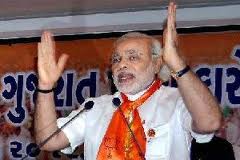
Rajkot, June 11: Chief minister Narendra Modi came to Rajkot on Sunday, what is essentially his bete noire Keshubhai Patel's home turf, but chose to make no mention of the dissidents. Even as Sanjay Joshi's supporters were shouting slogans against him outside the venue of the Gujarat BJP's two-day executive meeting, he took aim at the UPA in Delhi.
"Congress has little chance of survival," he told the party in Hindi on the concluding day of the two-day meet. "This government has disappointed the people of the country with a series of scams and failure to check corruption and price rise." Modi described the Congress as a sinking ship and exuded confidence that it would be completely wiped out in the state assembly elections.
"We have a bright chance of winning with a thumping majority as compared to earlier polls," he added. Hitting out at Prime Minister Manmohan Singh, Modi said, "Every time he (PM) assures the country that inflation would come down, it only increases. If you cannot bring prices down, at least bring them to the level where our Atal Behari Vajpayee left them."
He even hit out at the UPA for its failing to arrest the fall of rupee and blamed rampant corruption for its depreciation.
MODI 'UNMASKED'
People wearing Sanjay Joshi's masks appeared outside the venue of the state BJP executive meeting in Rajkot on Sunday as supporters of the ousted leader took a leaf out of chief minister Narendra Modi's book of poll strategy. They distributed pamphlets scoffing at Modi's prime ministerial ambitions. "I am an RSS member. I do not sell gauchar land. I do not do genocide for power. I do not compromise with my ideology to become prime minister. I do not change my colour for power," read the pamphlets. Joshi's supporters shouted slogans like "Sanjay Joshi tum aage badho, hum tumhare sath hain" and "kaho dilse, Sanjay Joshi phirse." The masks read, 'I am Sanjay Joshi' while protesting barely 200 metres from the venue of the BJP meet.





Comments
Add new comment